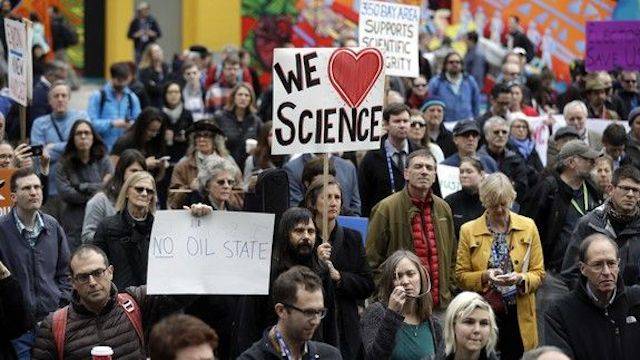
The Science Community’s Movement Against Trump
During President Trump’s first week in office, his administration has already started affecting the United States’ stance on climate change, including an examination of the Environmental Protection Agency (EPA) to determine which information will remain on their website. As part of the examination, EPA employees have also been instructed not to release any new information, including press releases, blog commentary, or social media posts.
Doug Erickson, the Trump administration’s EPA spokesperson, stated that the examination is being conducted to align the agency with the new administration’s policies. He did not comment on whether this alignment will include the removal of climate change research or the shifting of the EPA’s stance on climate change. Since the examination, some news sources have reported that the Trump administration wants the EPA’s scientific work to pass through a kind of political vetting process before being published.
During his campaign, President Trump spoke against climate change, tweeting in 2012 that “the concept of global warming was created by and for the Chinese in order to make US manufacturing non-competitive.” He spoke against environmental regulations that were hurting businesses, disapproved of climate policies like the Paris Agreement, and wanted to cut funding for UN climate change programs.
The social media and communication policies of other government agencies have also been affected by the new administration. For example, the Interior Department’s digital team was told to temporarily stop tweeting after a National Park Service post that compared inauguration crowd sizes.
Some actors are posting in defiance of these orders. Badlands National Park’s official Twitter account tweeted climate change statistics on Tuesday, which were subsequently deleted. Rogue Twitter feeds from more than a dozen US government agencies, including the EPA and NASA, have since been created in defiance of what they say is censorship on the part of the new administration.
The rogue Twitter feeds have since received a surge of support from the American public, with many popular feeds already reaching tens of thousands of followers. A former official at the Interior Department, supporting this sudden movement, stated that “[c]ivil servants have a job to do and part of that job is to interpret the national parks and history behind it.”
Scientists are also starting to mobilize in response to Trump’s administration. Jonathan Berman, a University of Texas Health Science Centre postdoctoral fellow, started plans for a science march on Washington. Since starting on Tuesday the 24th of January, the march’s Facebook page has already swelled to more than 300,000 members by Wednesday evening. The organizers of the science march are planning on announcing the date and logistics of their event in early February.
The march’s website, http://www.scientistsmarchonwashington.com/, clearly states their position:
“There are certain things that we accept as facts with no alternatives. The Earth is becoming warmer due to human action. The diversity of life arose by evolution. Politicians who devalue expertise risk making decisions that do not reflect reality must be held accountable. An American government that ignores science to pursue ideological agendas endangers the world.”
The response shows that the scientific community is starting to reach out to the public, not only to make their messages more accessible through social media but also to include non-scientists within their movement. The rogue Twitter feeds and the science march both encourage ordinary citizens to inform themselves against the recent surge of fake news and “alternative facts,” recognizing the influence that media has on the public’s perception of important issues.
The response from the scientific community against the new administration reveals the underlying influence of politics in their diverse disciplines. Although science strives towards some objective study of the physical and natural world through, what gets funded, researched, and reported is heavily influenced by politics. And even if a study is widely published and distributed, there is still no guarantee that it will be used to inform policy.
Overall, President Trump’s administration is already facing resistance from key stakeholders. The anti-inauguration riots, the international Women’s March, and the recent science movement show that many actors are against his current policies. Whether President Trump will be able to respond peacefully through negotiation, compromise, and understanding is uncertain. However, based on current trends, many have worried that he will respond harshly through further censorship and violence.
